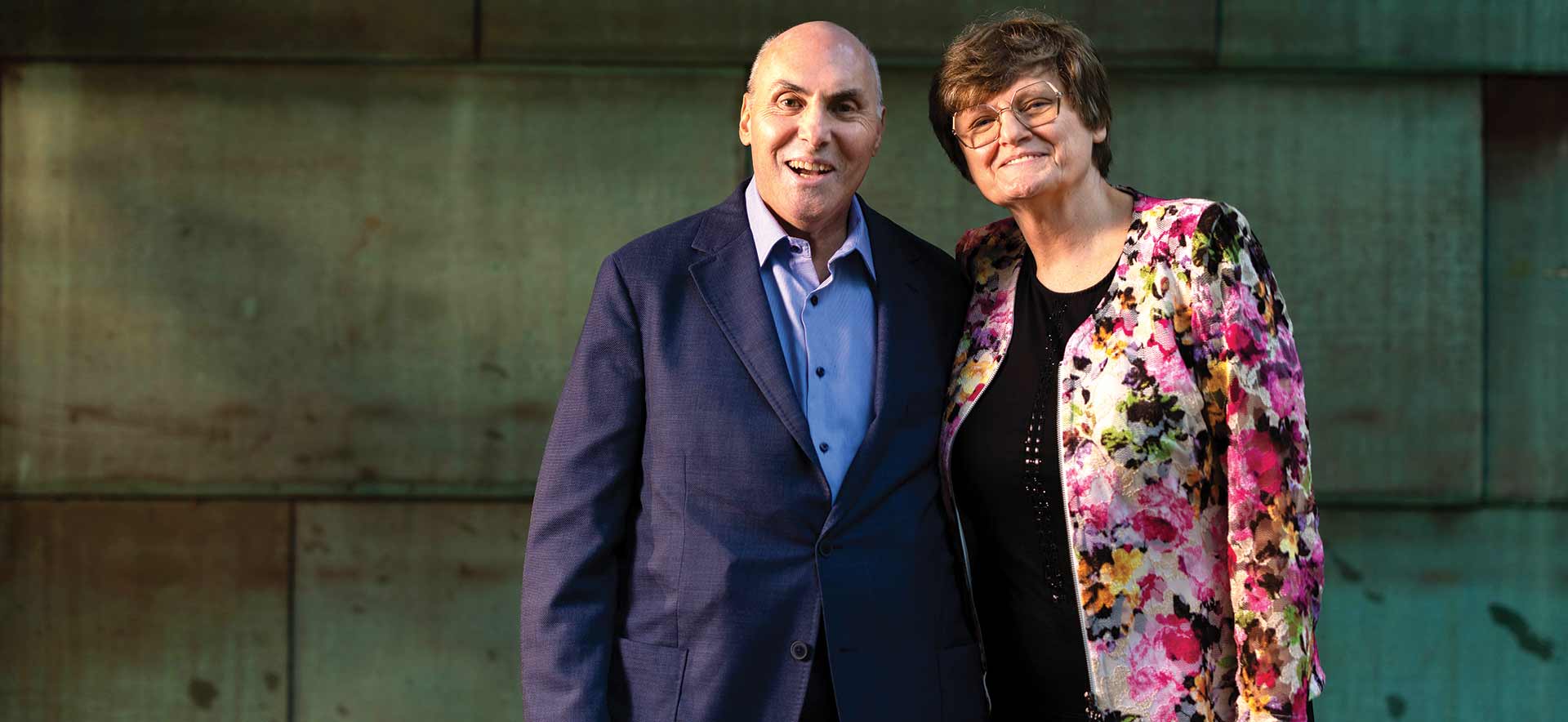‘One of the Great Scientific Accomplishments of Our Time’
Drew Weissman ’81, GSAS MA’81, P’15, H’23, receives a Nobel Prize for COVID-19 vaccine research.

Photo Credit: Dan Holmes
In October, Drew Weissman ’81, GSAS MA’81, P’15, H’23, and his longtime collaborator Katalin Karikó, H’23, were awarded the Nobel Prize in Physiology or Medicine for their pioneering contributions to developing effective mRNA vaccines, used to stem the COVID-19 pandemic.
Weissman and Karikó’s research laid the groundwork for the Pfizer-BioNTech and Moderna COVID-19 vaccines. The Nobel Committee noted that the mRNA vaccines and the COVID-19 vaccines based on different methodologies have been given more than 13 billion times worldwide, saving millions of lives and preventing severe disease in many more.
“Through their groundbreaking findings, which have fundamentally changed our understanding of how mRNA interacts with our immune system, the laureates contributed to the unprecedented rate of vaccine development during one of the greatest threats to human health in modern times,” the committee wrote.
Over years of painstaking research, Weissman and Karikó discovered that by engineering a modified version of mRNA — which transports instructions regarding the production of proteins to cells — and then developing a system to deliver it, they could trick the immune system into thinking the body is infected with a virus. The immune system then produces antibodies to create at least partial immunity.
In 2021, Brandeis and the Rosenstiel Foundation awarded Weissman and Karikó the 50th annual Lewis S. Rosenstiel Award for Distinguished Work in Basic Medical Research. The same year, the pair also received the Lasker-DeBakey Clinical Medical Research Award.
In May, Weissman and Karikó each received an honorary Doctor of Science during Brandeis’ 72nd Commencement ceremonies, at which Weissman delivered the keynote address.
“It is here that I honed my critical thinking skills, starting as a freshman in Shapiro Hall, and nurtured my passion for scientific exploration in Professor Gerry Fasman’s biochemistry lab,” Weissman said during his remarks. “I learned the value of collaboration and open-mindedness while being an active student, campus member, and part-time activist.”
“Drew’s pioneering research in messenger RNA is a true breakthrough for science,” said President Ron Liebowitz when the Nobel Prize was announced. “Through his visionary work, he has not only altered the course of a pandemic, but has advanced human knowledge and understanding in ways that will shape vaccine research for generations to come. His remarkable achievement is one of the great scientific accomplishments of our time.”
At Brandeis, Weissman, a Lexington, Massachusetts, native, studied biochemistry and enzymology, fulfilled pre-med requirements, and embarked on a lifetime of research. Outside the classroom, he fought for environmental and racial justice, and voting rights.
“Coming to Brandeis expanded my learning,” he said after receiving the Rosenstiel Award. “I learned about politics. I learned about psychology. I learned about sociology. I learned about music, theater, and opera. All of those things have continued to expand over my years after graduating. So I think it really broadened me as a person. But my main focus was in the lab doing research, and that’s where I was happiest.”
After Brandeis, Weissman earned a PhD and an MD from Boston University. He then completed a residency at Beth Israel Deaconess Medical Center and a fellowship at the National Institutes of Health, where he worked on HIV research under the supervision of Anthony Fauci, former director of the National Institute of Allergy and Infectious Diseases, and former chief medical adviser to President Joe Biden.
Since 1997, Weissman has been a professor of medicine at the University of Pennsylvania’s Perelman School of Medicine. He is also Roberts Family Professor in Vaccine Research and director at the Penn Institute for RNA Innovation.
“Among the few positive consequences of the current pandemic are the successful efforts made worldwide to generate effective vaccines,” says Michael Rosbash, the Peter Gruber Endowed Chair in Neuroscience and a 2017 winner of the Nobel Prize in Physiology or Medicine. “The most creative of these rely on the new messenger RNA technology pioneered by Karikó and Weissman. This is a great story, where individual initiative in basic science has ended up having a remarkable real-world impact.”
“I’m still a basic scientist. I always will be,” Weissman said during an April 2021 Brandeis event. “Basic science is being able to take an idea, and test it, and see if it works. And if it doesn’t work, you do something else.
“A career in basic science, to me, is incredibly satisfying.”